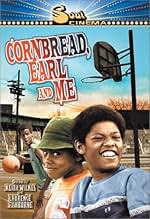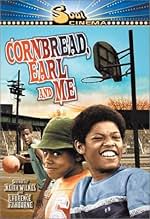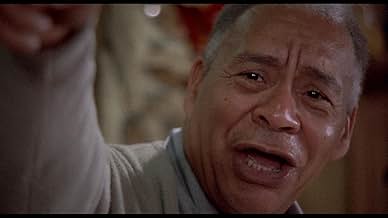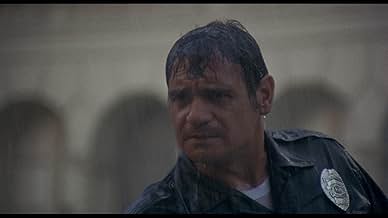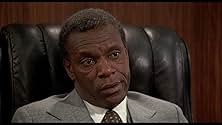NOTE IMDb
6,9/10
1,1 k
MA NOTE
Ajouter une intrigue dans votre langueA 12-year-old is traumatised by the murder of his friend, a star basketball player.A 12-year-old is traumatised by the murder of his friend, a star basketball player.A 12-year-old is traumatised by the murder of his friend, a star basketball player.
- Réalisation
- Scénario
- Casting principal
Jamaal Wilkes
- Nathaniel 'Cornbread' Hamilton
- (as Keith Wilkes)
Laurence Fishburne
- Wilford Robinson
- (as Laurence Fishburne III)
Avis à la une
A kid witnesses the shooting death of the neighborhood basketball star. The basketball player had been mistaken by the police as a crime suspect. The kid is subjected to harrassment from the policement involved to keep quiet about what he knows. The cops even go so far as to intimidate his mother. This is an early film appearance of Lawrence Fishburne's. He was thirteen or fourteen when he did this movie. The always magnificent late Rosalind Cash plays his mother. The film makes a sharp comment about the conflicts people have with the very people who are supposed to be protecting them.
I'm not going to summarize the story of this movie; you can find that above.
Rather, I'll just leave my comments on the experience of watching it.
The ;movie is well acted throughout. And that can, at times, make it difficult to watch. When one of the characters is killed, it is difficult to watch his mother's at first unbelieving reaction to the tragedy. You feel something of her grief just in watching the contorsions of her face and body. It's not easy to watch.
Later, watching the police dept intimidate witnesses to avoid a wrongful homicide verdict is also difficult to watch, but in a different sense. You see how powerless the people in this poor neighborhood are to fight back against such administrative corruption. (I also suppose it doesn't make a lot of sense. I would imagine, though I don't know this as a fact, that even in 1975 police depts would have been insured against such expenses.)
It's refreshing that it is a Black lawyer who wins this suit, and not some Great White Savior.
But at the end, you have no assurance that the same thing won't happen again. And again. And again. The shooting of the young Black man was not directly an act of racism - one of the policemen who shot at him was Black himself, and they had been told the rapist they were pursuing was Black. His death is, rather, the result of sloppy procedure and very bad coincidence.
But the intimidation of the potential witnesses by police dept reps suggests that the people in this neighborhood and other poor ones like it have little access to real justice.
Rather, I'll just leave my comments on the experience of watching it.
The ;movie is well acted throughout. And that can, at times, make it difficult to watch. When one of the characters is killed, it is difficult to watch his mother's at first unbelieving reaction to the tragedy. You feel something of her grief just in watching the contorsions of her face and body. It's not easy to watch.
Later, watching the police dept intimidate witnesses to avoid a wrongful homicide verdict is also difficult to watch, but in a different sense. You see how powerless the people in this poor neighborhood are to fight back against such administrative corruption. (I also suppose it doesn't make a lot of sense. I would imagine, though I don't know this as a fact, that even in 1975 police depts would have been insured against such expenses.)
It's refreshing that it is a Black lawyer who wins this suit, and not some Great White Savior.
But at the end, you have no assurance that the same thing won't happen again. And again. And again. The shooting of the young Black man was not directly an act of racism - one of the policemen who shot at him was Black himself, and they had been told the rapist they were pursuing was Black. His death is, rather, the result of sloppy procedure and very bad coincidence.
But the intimidation of the potential witnesses by police dept reps suggests that the people in this neighborhood and other poor ones like it have little access to real justice.
The film does have a moderately intriguing mesage about polkice brutality and political corruption being obscenely hoisted upon African American communities in the urban United States. That said, the film is horribly dated, and elements of it are unnacceptable by today's standards. I mean the slain icon's name is Cornbread for Pete's sake!!! Where wre his cohorts Fried Chicken and Watermelon? Moreover, the societal corruption is presented in a way that makes us feel sad and powerless rather than angry and indignant. This is really a product of the early seventies Blaxploitation genre that would be utterly offensive by today's standards were it not for the still relevant and timely subject matter of the film. Worthwhile viewing for those who can differentiate between the message and the overdone elements. I fear, however, that the film's excess could leave white biggots laughing at the maudlin African American stereotypes on parade rather than addressing the political concerns of the film at all.
Seeing that this is one of the first, if not the first, Hollywood movies fully to address the issue of police brutality toward African Americans, a problem that remains unsolved, I am inclined to cut this film a whole lot of slack. I am willing to overlook the Lorraine Hansbury wannabe dialogue and over the top acting, surprising for such a distinguished cast. I will even forgive the bombastic, intrusive music score. Because, however crudely at times, director Joe Manduke conveys the feel of a community oppressed as well as the difficulty of and need to stand up to the oppressor. So that by the end of the film one is both angered and stirred. And not spuriously, either Give it a B minus.
PS...One exception to the general histrionics of the acting is a very young Laurence Fishburne whose testimony at the inquest is, by far, the film's best scene. That it is also the only one without music is not, in my view, coincidental.
PS...One exception to the general histrionics of the acting is a very young Laurence Fishburne whose testimony at the inquest is, by far, the film's best scene. That it is also the only one without music is not, in my view, coincidental.
Jamaal Wilkes, Laurence Fishburne (in his first big-screen role), and Tierre Turner are shooting hoops when it begins to rain. They go into Charles Lampkin's store, and Wilkes buys treats for the other boys. He's in a good mood, because he's the first in the neighborhood who will go to college, on a football scholarship, and he will be going tomorrow. They start to banter about how fast he is, and he starts to run home in the rain. Police officers, pursuing a suspect, mistake Wilkes. They shoot him dead.
It's Moses Gunn whom Madge Sinclair and Stack Pierce, Wilkes' parent hire to get the Police admit they made a mistake, and it's Rosalind Cash, Fishburne's mother, who nurtures him. Some of the roles, like Stefan Gierasch as the cop who intimidates witnesses, are pretty much stereotypes, but that's the point of this movie: to see the Black people in it as individuals. Despite an occasionally clunky pacing, it does that very well.
It's Moses Gunn whom Madge Sinclair and Stack Pierce, Wilkes' parent hire to get the Police admit they made a mistake, and it's Rosalind Cash, Fishburne's mother, who nurtures him. Some of the roles, like Stefan Gierasch as the cop who intimidates witnesses, are pretty much stereotypes, but that's the point of this movie: to see the Black people in it as individuals. Despite an occasionally clunky pacing, it does that very well.
Le saviez-vous
- AnecdotesLaurence Fishburne's film debut. He is credited as Laurence Fishburne III.
- GaffesWhen a clay pot is thrown at Officer Atkins and hits the windshield of his cruiser, it breaks. Pieces of glass hit Atkins and embed in his face. But windshields are made of safety glass and though windshields break, they keep the glass in place. So, the glass in this windshield would NOT have flown at Atkins, let alone embed in his face. He would have come out of this situation shaken but physically unharmed.
- Citations
Wilford Robinson: ...they killed Cornbread and he wasn't doin' nothin'
[pause]
Wilford Robinson: all he was doin wuz jus goin' home...
- ConnexionsFeatured in Dusk to Dawn Drive-In Trash-o-Rama Show Vol. 2 (1996)
Meilleurs choix
Connectez-vous pour évaluer et suivre la liste de favoris afin de recevoir des recommandations personnalisées
- How long is Cornbread, Earl and Me?Alimenté par Alexa
Détails
- Date de sortie
- Pays d’origine
- Site officiel
- Langue
- Aussi connu sous le nom de
- Hit the Open Man
- Lieux de tournage
- Sociétés de production
- Voir plus de crédits d'entreprise sur IMDbPro
Box-office
- Budget
- 800 000 $US (estimé)
Contribuer à cette page
Suggérer une modification ou ajouter du contenu manquant

Lacune principale
By what name was Cornbread, Earl and Me (1975) officially released in India in English?
Répondre

